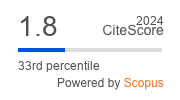Aspect Level Sentiment Analysis on Zoom Cloud Meetings App Review Using LDA
Abstract
During the Covid-19 pandemic, almost all community activities are conducted from home. Therefore, video conference technology is needed for people to carry out their normal activities from home. One of the video conference applications is ZOOM Cloud Meetings. Applications certainly have been reviewed given by their users as a reference for new users and companies of the application to know the application’s performance. However, in reviews, some constraints are the number of reviews as well as irregular. Therefore, a solution is needed with sentiment analysis that aims to classify the reviews of the application to be organized by categorizing positive or negative sentiment. In this study, aspect-based sentiment analysis was conducted on ZOOM Cloud Meetings app reviews from Google Play Store. The analysis’s result of the review data obtained three aspects, namely aspects of usability, system, and appearance. The modeling topic used is the Latent Dirichlet Allocation (LDA) method and classification using the Support Vector Machine (SVM). This research resulted in the best performance with the best parameters resulting in the performance accuracy of usability aspect is 88.83%, system aspect with 91.2%, appearance aspect with 94.78%, and performance accuracy of all aspects 91.61%.
Downloads
References
Zoom, “Zoom Help Center,” 2021. [Online]. Available: https://support.zoom.us/hc/en-us (accessed Aug. 16, 2021).
W. Medhat, A. Hassan, and H. Korashy, “Sentiment analysis algorithms and applications: A survey,” Ain Shams Eng. J., vol. 5, no. 4, pp. 1093–1113, 2014, doi: 10.1016/j.asej.2014.04.011.
N. Herlinawati, Y. Yuliani, S. Faizah, W. Gata, and S. Samudi, “Analisis Sentimen Zoom Cloud Meetings di Play Store Menggunakan Naïve Bayes dan Support Vector Machine,” CESS (Journal Comput. Eng. Syst. Sci., vol. 5, no. 2, pp. 293–298, 2020, doi: 10.24114/cess.v5i2.18186.
D. Ekawati and M. L. Khodra, “Aspect-based sentiment analysis for Indonesian restaurant reviews,” in ICAICTA 2017,International Conference on Advanced Informatics: Concepts, Theory and Applications International Conference on Advanced Informatics: Concepts, Theory and Applications, 2017, pp. 1–6, doi: 10.1109/ICAICTA.2017.8090963.
E. Wahyudi and R. Kusumaningrum, “Aspect Based Sentiment Analysis in E-Commerce User Reviews Using Latent Dirichlet Allocation (LDA) and Sentiment Lexicon,” in ICICOS 2019 - 3rd International Conference on Informatics and Computational Sciences: Accelerating Informatics and Computational Research for Smarter Society in The Era of Industry 4.0, Proceedings, 2019, pp. 1–6, doi: 10.1109/ICICoS48119.2019.8982522.
K. Bastani, H. Namavari, and J. Shaffer, “Latent Dirichlet allocation (LDA) for topic modeling of the CFPB consumer complaints,” Expert Syst. Appl., vol. 127, pp. 256–271, 2019, doi: 10.1016/j.eswa.2019.03.001.
Suhardjono, W. Ganda, and H. Abdul, “Prediksi Kelulusan Menggunakan Svm Berbasis Pso,” Bianglala Inform., vol. 7, no. 2, pp. 97–101, 2019.
Trias Ismi, “Web Scraping: Pengertian dan Apa Saja Manfaatnya Bagi Bisnis,” glints, 2021. [Online]. Available: https://glints.com/id/lowongan/web-scraping-adalah/#.X7YvE2gzaMp (accessed Mar. 11, 2021).
H. Manning, Christopher D. and Raghavan, Prabhakar and Schutze, Introduction to Modern Information Retrieval. USA: Cambridge University Press, 2008.
K. SetyoNugroho, “Dasar Text Preprocessing dengan Python,” Medium.com, 2019. [Online]. Available: https://medium.com/@ksnugroho/dasar-text-preprocessing-dengan-python-a4fa52608ffe (accessed Nov. 12, 2020).
H. Jelodar et al., “Latent Dirichlet allocation (LDA) and topic modeling: models, applications, a survey,” Multimed. Tools Appl., vol. 78, no. 11, pp. 15169–15211, 2019, doi: 10.1007/s11042-018-6894-4.
D. M. Blei, A. Y. Ng, and M. I. Jordan, “Latent Dirichlet allocation,” J. Mach. Learn. Res., vol. 3, no. 4–5, pp. 993–1022, 2003, doi: 10.1016/b978-0-12-411519-4.00006-9.
C. Doig, “Introduction to Topic Modeling in Python,” CONTINUUM analytics, 2015. [Online]. Available: http://chdoig.github.io/pygotham-topic-modeling/#/ (accessed Nov. 16, 2020).
J. P. Jiawei Han, Micheline Kamber, Data mining: Data mining concepts and techniques, third edition. San Francisco: Morgan Kaufmann Publishers, 2012.
I. Mathilda Yulietha and S. Al Faraby, “Klasifikasi Sentimen Review Film Menggunakan Algoritma Support Vector Machine,” e-Proceeding Eng., vol. 4, no. 3, pp. 4740–4750, 2017.
X. Ma, “Dimensionality-Reduction with Latent Dirichlet Allocation,” towards data science, 2019. [Online]. Available: https://towardsdatascience.com/dimensionality-reduction-with-latent-dirichlet-allocation-8d73c586738c (accessed May 21, 2021).
Copyright (c) 2021 Jurnal RESTI (Rekayasa Sistem dan Teknologi Informasi)

This work is licensed under a Creative Commons Attribution 4.0 International License.
Copyright in each article belongs to the author
- The author acknowledges that the RESTI Journal (System Engineering and Information Technology) is the first publisher to publish with a license Creative Commons Attribution 4.0 International License.
- Authors can enter writing separately, arrange the non-exclusive distribution of manuscripts that have been published in this journal into other versions (eg sent to the author's institutional repository, publication in a book, etc.), by acknowledging that the manuscript has been published for the first time in the RESTI (Rekayasa Sistem dan Teknologi Informasi) journal ;








